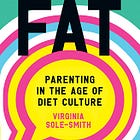The Body Image Talk We’re Not Having With Boys
An interview with parent coach and diet culture educator Oona Hanson.
I’ve been so excited to run this Q&A with parent coach and educator
, author of the fantastic Substack . Oona has a private practice and has also worked as a Family Mentor at Equip Health, where she was part of multidisciplinary care teams treating children with eating disorders.I’ve written before about raising fat-positive kids and about kids and diet culture, but for today’s newsletter, I wanted to talk to Oona specifically about boys. I’ve noticed that parental concern about diet culture and disordered eating typically focuses on girls, not boys, and that body image issues often look different (and can be harder to detect) in boys.
We can easily spot a burgeoning problem if a girl starts restricting what she eats or talking about the desire to be smaller. But with a boy, body image issues can manifest more subtly and masquerade as a boy trying to “be healthy” or look more muscular. I wanted to understand from Oona what parents should be looking for when it comes to boys and eating disorders, as well as how we should talk to boys about their bodies and body image more broadly. I found our conversation enlightening.
Oona, the conversation about kids and diet culture is often understandably focused on girls. But I know boys are at risk for developing disordered eating and exercise habits, too. What do we know from the data about how often this happens, and how readily it is diagnosed and addressed?
I’m so glad you asked because when I meet people and they ask what I do, I can’t tell you how often someone will say, “Phew, I’m glad I have sons so I don’t have to worry about that stuff!” And then I have to gently educate them about why boys aren’t immune to body image concerns and eating disorders. Most parents are pretty shocked to hear the statistics. A 2020 study estimated that 1 in 7 males will experience an eating disorder by age 40. Boys and men currently make up about a quarter of people currently in eating disorder treatment, but we know the actual number of those suffering with an eating disorder is much higher because they are underdiagnosed.
Parents of boys are often less likely to have eating disorders on their radar, and even when they do notice some potential warning signs, there’s no guarantee the boy’s doctor will know enough to help. I’ve known parents who took their sons to the pediatrician because of excessive exercise, restrictive eating, and weight loss, but the doctor dismissed a dangerously low pulse as “just an athlete’s heart” and concluded the child was fine because their BMI wasn’t low (only about 6 percent of people with eating disorders are considered medically “underweight.”)
In terms of getting treatment, there are other gender barriers. Some programs are only for women and girls. And across the board, the eating disorder treatment field is female dominated; that lack of representation can sometimes create an additional challenge.
I have a 14-year-old boy who plays soccer, and what I have noticed recently is that he and his friends have a growing interest in "being athletic." Among other things, they do sit-ups and push-ups and run laps at home. I am honestly not sure how to feel about this, or how to talk about these desires and goals. I do want my son to be physically active and I like that he is showing an increasing interest in taking care of his body and health. On the other hand, I worry that perhaps he's less interested in his health than he is having a particular body type or conforming to certain expectations of masculinity. What's the best way for parents to support and encourage healthy habits while also helping boys identify and push back on unhealthy body image expectations and diet culture?
It’s so hard! I think you’re already ahead of the game just by being aware that boys have body image, too, and that these otherwise healthy behaviors can develop into disorders. Knowing that exercise and even “healthy eating” can become unhealthy means you’re more likely to spot signs of trouble. And you’re right to wonder about the pressure to “appear” athletic. Just like we have a (false) cultural idea of what health “looks like,” we also have a pretty narrow idea of what athleticism “looks like.” And boys are being bombarded with hypermuscular images, many of which are photoshopped or even AI generated. Also, if an adolescent boy is comparing his body to that of a grown man who also happens to be a professional athlete or an actor who just spent six months of his life preparing for an action role? It can be a recipe for feeling inadequate.
I used to be an English teacher, so I’m probably biased, but I think books about these topics can be really helpful. The book Being You: The Body Image Book for Boys is one I often recommend. Even if the boy never reads much of the book himself, it’s a great conversation-starter.
The most powerful thing we can do as parents is to model a healthy relationship with food, exercise, and our body. Easier said than done in this world, but it’s worth trying.
With boys I've noticed that dieting isn't necessarily about eating less, but about eating certain types of foods in the "right" proportions. If we notice boys eating in a regimented way, what should we do? What could happen if we don't do anything?
With boys who are struggling with food, it might not always look like “dieting” per se. The current protein obsession has really hooked a lot of boys and young men. Rather than counting calories, boys are more likely to be counting macros, and you might hear phrases like “bulking and cutting,” “cheat days,” and requests for supplement powders. At the same time, it’s important for parents to know boys get anorexia nervosa, too.
If parents have any gut feeling that something is wrong, it’s important to talk to their sons and get support. It’s worth saying something like, “I noticed you’ve changed X, and I would love to know more about that.” Or “Tell me more about why you think you need Y grams of protein every day.”
I know that many parents are afraid to say something because they’re worried about making things worse. But the truth is that disordered eating doesn’t tend to get better on its own.
Eating disorders aren’t a phase. They are serious illnesses that can be life-threatening.
It’s very rare that parents catch an eating disorder at the very beginning, especially because so many of the behaviors are normalized and even encouraged by diet culture. Boys tend to be much more severely ill when they finally get care.
In my experience, by the time parents are worried, things are often pretty bad already. So if you’re concerned, don’t wait. I’ve never met a family who didn’t wish they had acted sooner to help their child.
A friend of mine has a son who plays football, and his coach gave the team weight goals for this summer — not for weight loss, but weight gain. Is this okay? How should we talk to our boys about weight directions like this? What if a coach instead emphasizes the importance of eating a specific way?
I don’t know enough to speak specifically about the safety of encouraging kids to be bulking up for their sport (the overall safety risks inherent in tackle football seem like more of a health concern to me).
But in general, youth sports coaches really shouldn’t be giving nutrition guidance to teens. They don’t mean harm, but unless they have specific training in adolescent sports nutrition (and, ideally, in eating disorders), they’re likely to give advice that isn’t appropriate and even dangerous for growing boys.
Coaches wield a lot of power, and their players often hang on their every word. They have to be very careful, but they don’t know what they don’t know. Even off-hand comments about their own eating or casual admonitions to the players to “cut out the junk” can go sideways.
What should parents say if their boys ask self-conscious questions about their bodies, like "Do you think I'm fat?" or "Do you think I have big biceps?"
We’re conditioned in our culture to respond to these kinds of questions with praise and reassurance — things like “Oh, honey, you’re not fat, you’re an adorable big guy!” Or we get uncomfortable with their question and want to “fix” it with something like, “Oh, you want bigger biceps? Let me show you how to do a proper push-up.” But I think we can do better.
The most important thing is for parents to lean in and connect with their kids. They’re coming to you with this sensitive topic — so you’re already starting from a great place. In those situations, we have an opportunity to show we can be a safe place to come to and that we can handle these tricky issues. This can be really hard, especially if it’s bringing up some of our own body image baggage.
It’s familiar advice to parents, but it’s worth repeating: try to listen and ask questions (this can also buy us some time to get a little calmer). The old standbys like “What do you mean by that?” or “Tell me more” can go a long way.
It’s a chance to hear about the pressures they’re feeling and offering validation for how hard it can be to have a body in a world that’s always telling us we should look a certain way. We might even name things like diet culture and fat phobia and find out what they already know.
What are some things that parents, teachers or coaches sometimes unwittingly do that can put boys at risk for eating disorders or body image issues?
Because of gender stereotypes and myths about eating disorders, adults can completely forget that boys also struggle with food and body. It could be something like talking about their own diet or weight or even teasing boys about their body in what the adult assumes is a loving way. There’s also this common trope of parents expressing shock at how much teenage boys eat, using phrases like “bottomless pit” or “eating us out of house and home.” I get that groceries are really expensive, but we don’t want to shame our kids for having an appetite. (As a side note, adolescent girls have big appetites, too!)
We forget how much energy growing kids need. And in a culture obsessed with thinness and restriction, we can sometimes imply that having an appetite and gaining weight are a problem — when those two things are literally essential for our kids to grow. So I think adults are wise to be mindful about how they talk about their own bodies as well as other people’s. Even comments about male celebrities, public figures, etc. are all sending a message to our boys about what we think about bodies (I wrote a piece for CNN about this issue in relation to Trump — ooh, boy, did I get a lot of hate mail!)
What are some other signs parents might want to keep an eye out for that would suggest that a boy is struggling with food or body image issues, and how would you suggest parents address them?
For food, if your son is cutting things out of his diet (without a medical need) even if it’s something like sugar or “junk food,” it’s worth being curious and paying attention. The change may be coming from a genuine concern about their health, but it might also signal a deeper anxiety that deserves support. Most parents don’t know that energy deficit itself, even by accident, can catalyze an eating disorder. So whether it’s increased athletic training without adequate refueling or something like wisdom teeth extractions or a bad stomach bug, losing a few pounds can be what flips the metaphoric switch in someone with the genetic vulnerability for an eating disorder.
Some other things that could be warning signs:
Reading food labels or becoming particular about how family meals are prepared
Cooking/baking for others without eating the food themselves
Weight loss or lack of expected gain
A parent discovering wrappers or other evidence that suggests eating in secret
Avoiding eating with the family
Body checking (e.g., lots of time in the mirror, measuring or weighing themselves, etc.)
Exercise that seems excessive or rigid
Hiding their body in baggy clothes, avoiding pool/beach
Following fitness or nutrition influencers on social media
Making food and exercise decisions based on data from a wearable tracker (aside from a CGM for diabetes or HR monitor for certain medical conditions)
Fear of vomiting or choking that is getting in the way of eating
A diet so limited that it’s affecting growth or social development
Mood changes, social withdrawal
Insomnia
Constipation
It might not be an eating disorder, but you can’t go wrong with expressing curiosity and compassion. And even if — and maybe especially if — he gets angry, defensive, or insists he’s “fine” or just “being healthy,” it’s important to get him seen by a medical professional. And if the primary care doctor dismisses your concerns, listen to your gut and ask for a referral to an eating disorder specialist (either a dietitian or therapist/psychologist/psychiatrist).
Despite some harmful myths, eating disorders don’t have to be a life sentence. Recovery is possible.







Thank you so much for this, from the mom of two boys.
Thank you for this. My 4 year old son wasn’t eating much for a day or two after he visited family with my partner. I didn’t think much of it at first. He was talking a lot about his 16 year old relative playing catch with him and how much fun they had. He also mentioned his aunt kept asking the 16 year old if he was hungry and he said no. After some sleuthing and some more talk with my son, I learned the teen was cutting as he plays baseball year round and this is part of his training. My 4 year old picked up on this and wanted to be like his older cousin and started eating less! I was shocked and saddened and then relieved to be able to figure it all out and help get him back on track and eating. The younger ones are watching and listening too!